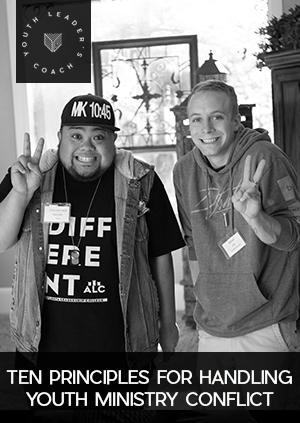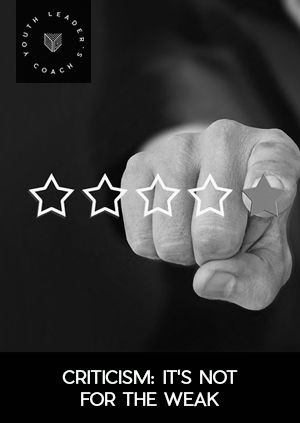When Criticism Comes Calling
I just left yet another youth pastor. I was trying to be a friend to this youth leader who, in his words, is "getting his head kicked in." The issue? Criticism. And in his mind, a discouraging and deafening amount of it right now.
I think that maybe criticism robs more youth leaders of their joy and fulfillment in ministry almost more than anything else. It's not really a question of "Will I be criticized?" The more realistic question is, "How can I be successful in youth ministry while being criticized?" Your grandma really was right when she told you, "Criticism will either make you bitter or better." Aristotle even weighed in on the subject. He wisely said, "Criticism is something you can avoid easily...by saying nothing, doing nothing, and being nothing."
So let me share some of the ways I try to think and respond when, like my friend said, "I'm getting my head kicked in" by criticism...and take encouragement knowing that it happens to me all the time. Did I mention, "All the time?"
- I try to evaluate the difference between constructive and destructive criticism.
Proverbs talks about the importance of constructive criticism when it says, "Let my brother smite me for it will be a kindness to me." So one of the greatest ways we ever grow in ministry and life is to have people give us constructive criticism, even when it feels humbling and painful. - Look beyond the criticism and try to see the critic.
I've learned not to put much stock in the nameless criticisms that abound in ministry, ie. "Lots of people think..." To take a criticism seriously, I need to know the names associated with it. Some people criticize so often that they act as though it is their "spiritual gift"! When a criticism comes from them, I just realize they are living up to their standard performance. But other times, when I hear a name, I immediately get on the phone to say, "Can we talk?" The difference is because I know those people are not characterized by a critical spirit. I often tell myself, "Instead of trying to put others in their place, try to put yourself in their place." - Remember that even the best parents can occasionally become defensive and reactionary when it comes to their own children.
So when criticism comes from them, try to graciously hear them out and see things from their perspective. It is agonizingly easy for normally sane parents to "go on the war path" if they perceive that their teenager has been wounded or treated unfairly. Just give extra grace in those moments. One day, these same parents will probably tell others that you were "the best youth leader" their student ever had. - Remember that even Jesus was often criticized and deeply misunderstood.
Christ was constantly criticized, most painfully from inside the church world. He was accused of being a glutton, a man who hung out with sinners, and even of being a Samaritan (one of the lowest accusations possible back then). 1 Peter 5:21-23 says it well, "For you have been called for this purpose, since Christ also suffered for you, leaving you an example to follow in His steps. He committed no sin...but while He was reviled, He did not revile in return. While He suffered, He did not utter negative threats. He just kept entrusting Himself to Him who judges righteously." - Remember that jealousy and criticism are often the "trophy" that mediocrity pays to excellence. So if you feel that jealousy and insecurity are at the root of the criticism, don't allow the criticism to become too huge in your own mind.
Allow time to prove the person wrong. The day after Lincoln gave his famed Gettysburg Address, a prominent newspaper wrote, "The cheek of every American must tingle with shame as he reads the silly, flat utterances of a man who now serves as the President of the United States." So take courage from Abe Lincoln, and remember that time will often be your vindicator. - Guard carefully your own attitude toward the critic. A negative attitude toward criticism can sometimes cause you more internal damage than the actual criticism itself.
So fight to not let yourself respond negatively. Just remember that you cannot sink someone else's end of the boat and still keep your own end afloat. So ask the Lord to help you be bigger than any pain, anger, or misunderstanding that you feel. He will celebrate that request. I promise.
In short, I've often made the mistake of taking other people's opinions of me too seriously while not taking God's opinion of me seriously enough. So when criticism starts to "kick your head in," try to focus on the Lord's opinion of you more than that of others. He always understands what you are facing and remains solidly in your corner, cheering you on along the youth ministry journey. For extra encouragement, remind yourself of what the history books say about Abe Lincoln these days!
I just left yet another youth pastor. I was trying to be a friend to this youth leader who, in his words, is "getting his head kicked in." The issue? Criticism. And in his mind, a discouraging and deafening amount of it right now.
I think that maybe criticism robs more youth leaders of their joy and fulfillment in ministry almost more than anything else. It's not really a question of "Will I be criticized?" The more realistic question is, "How can I be successful in youth ministry while being criticized?" Your grandma really was right when she told you, "Criticism will either make you bitter or better." Aristotle even weighed in on the subject. He wisely said, "Criticism is something you can avoid easily...by saying nothing, doing nothing, and being nothing."
So let me share some of the ways I try to think and respond when, like my friend said, "I'm getting my head kicked in" by criticism...and take encouragement knowing that it happens to me all the time. Did I mention, "All the time?"
- I try to evaluate the difference between constructive and destructive criticism.
Proverbs talks about the importance of constructive criticism when it says, "Let my brother smite me for it will be a kindness to me." So one of the greatest ways we ever grow in ministry and life is to have people give us constructive criticism, even when it feels humbling and painful. - Look beyond the criticism and try to see the critic.
I've learned not to put much stock in the nameless criticisms that abound in ministry, ie. "Lots of people think..." To take a criticism seriously, I need to know the names associated with it. Some people criticize so often that they act as though it is their "spiritual gift"! When a criticism comes from them, I just realize they are living up to their standard performance. But other times, when I hear a name, I immediately get on the phone to say, "Can we talk?" The difference is because I know those people are not characterized by a critical spirit. I often tell myself, "Instead of trying to put others in their place, try to put yourself in their place." - Remember that even the best parents can occasionally become defensive and reactionary when it comes to their own children.
So when criticism comes from them, try to graciously hear them out and see things from their perspective. It is agonizingly easy for normally sane parents to "go on the war path" if they perceive that their teenager has been wounded or treated unfairly. Just give extra grace in those moments. One day, these same parents will probably tell others that you were "the best youth leader" their student ever had. - Remember that even Jesus was often criticized and deeply misunderstood.
Christ was constantly criticized, most painfully from inside the church world. He was accused of being a glutton, a man who hung out with sinners, and even of being a Samaritan (one of the lowest accusations possible back then). 1 Peter 5:21-23 says it well, "For you have been called for this purpose, since Christ also suffered for you, leaving you an example to follow in His steps. He committed no sin...but while He was reviled, He did not revile in return. While He suffered, He did not utter negative threats. He just kept entrusting Himself to Him who judges righteously." - Remember that jealousy and criticism are often the "trophy" that mediocrity pays to excellence. So if you feel that jealousy and insecurity are at the root of the criticism, don't allow the criticism to become too huge in your own mind.
Allow time to prove the person wrong. The day after Lincoln gave his famed Gettysburg Address, a prominent newspaper wrote, "The cheek of every American must tingle with shame as he reads the silly, flat utterances of a man who now serves as the President of the United States." So take courage from Abe Lincoln, and remember that time will often be your vindicator. - Guard carefully your own attitude toward the critic. A negative attitude toward criticism can sometimes cause you more internal damage than the actual criticism itself.
So fight to not let yourself respond negatively. Just remember that you cannot sink someone else's end of the boat and still keep your own end afloat. So ask the Lord to help you be bigger than any pain, anger, or misunderstanding that you feel. He will celebrate that request. I promise.
In short, I've often made the mistake of taking other people's opinions of me too seriously while not taking God's opinion of me seriously enough. So when criticism starts to "kick your head in," try to focus on the Lord's opinion of you more than that of others. He always understands what you are facing and remains solidly in your corner, cheering you on along the youth ministry journey. For extra encouragement, remind yourself of what the history books say about Abe Lincoln these days!
Related Items
Conflict in youth ministry is always present. As Charlie Brown once said, "I love mankind, it’s just people that I can’t stand." The truth is...where there are people, there's conflict. According to a Stanford University study, the success of an individual in corporate America depends only on 15% product knowledge, but 85% people knowledge. I think the same thing applies in youth ministry.
My life in youth ministry over the decades has had all sorts of opportunities to handle conflict. This is such a critical skill to have in ministry! I pray that you'll apply these ten principles to the conflict you are bound to encounter in your own ministry.
Your "long-distance" cheerleader,

Some of us haven't seen the 1997 American action film that I took this name from, but I think in Christianity, many of us play "Face/Off" on a pretty regular basis. It's especially easy for our students to KEEP CHANGING FACES on who they are in their everyday life. I'm not talking about being "full blown fake" or hypocritical. They just slowly give themselves permission to be one person in front of some people and another person in front of others. In all honesty, sometimes we can all be a little "spiritually schizo."
In this month's Source, "Face/Off," I'm sharing with our gang some of the symptoms and causes of becoming a "Face/Off" person. You'll hear me come back again to one of the most pivotal aspects of shaping our students' Christian walk...friendships. So listen in and share it with your own youth gang. I promise it will be an incredible night for you!
Lovingly,

This month's Source, "Ender's Game Live," is a powerful outreach night where we are daring our students to live differently.
Using three students to profile all different walks of life, a texting poll and of course, the movie Ender's Game, this is a complete interactive drama night that your gang will love. The challenge is for our students to push past their insecurities and be bold in their commitment to the Lord. No matter where you students are at personally, this night will connect with all of them.
"This is the story of Ender, but more importantly, this is your story. When you face adversity, ridicule, and criticism, what will you choose to do? When things get tough, will you choose to be different or to look like everybody else?"
Lovingly,

I was prepared for SPIRITUAL WARFARE when I entered ministry. But the unexpected punches emotionally came from the CRITICISM that became an almost "daily norm" for me especially from other Christian people. Criticism reminds me of the phrase "Death by 1,000 cuts," referencing slow slicing, a form of torture and capital punishment practiced in Imperial China. And as repeated small criticisms come, we find ourselves slowly dying on the inside.
In this month's Youth Leader's Coach, "Criticism: It's Not For The Weak," I'm navigating how to deal with criticism. Elbert Hubbard once saying, "To avoid criticism, do nothing, say nothing and be nothing." Isn't that true? As a leader, criticism comes with the territory. So, listen in as I share some of the lessons I've learned through the years while navigating the "world of criticism."
Lovingly,

Life isn't always a party! During the rough times, people give cheap answers. But HOW do you live victoriously when the "tough times" come into your life? That's the question we are answering in this month's Source, "Hang Tough."
Looking at Luke 29, we'll see how Jesus made it through the toughest challenge anyone has ever experienced...that of being brutally hung on a cross for the sins of the universe. I'm sharing four takeaways that we can apply to our own tough life situations. We're asking Jesus to make us "HANG TOUGH" people.
Hanging in there,







